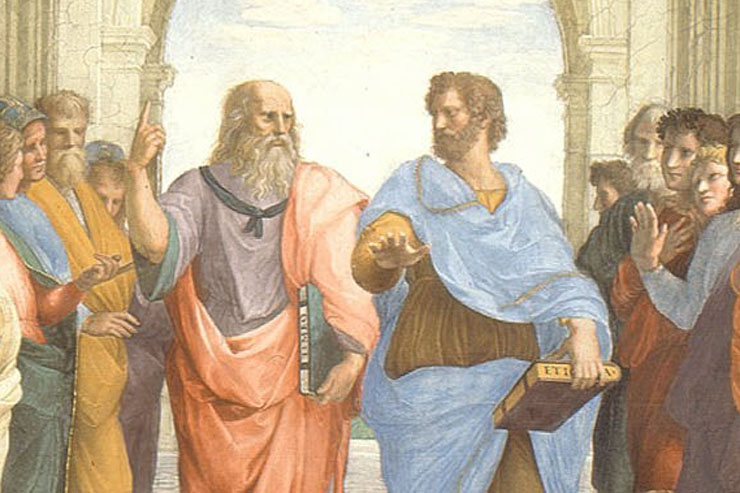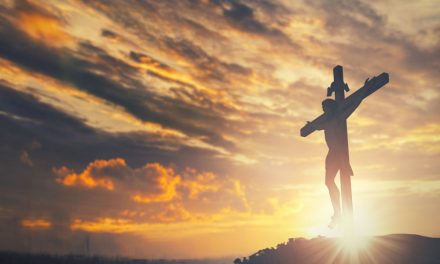
“The School of Athens” (detail showing Aristotle with the elder Plato) by Raphael
A number of years ago, Sister Regina Marie OCD, spoke here at the Atlanta Catholic Business Conference. It was one of the most profound, yet accessible and relevant, talks I have ever heard.
She asked, “What is the greatest of truths?” The answer she gave after a time of discussion with the audience was simply this, “God is.” “God is what?” someone asked. “That’s all,” she said, “God is… He exists!”
And I would suggest that possibly the second greatest truth is that all that exists apart from God comes from Him.
In today’s second reading (James 1:17-18), we hear that “all good giving and every perfect gift is from above,” that is, we hear that everything good is from God.
James teaches this based on God’s attributes. Although God is one and cannot be divided in His essence, we describe Him in terms of His various attributes or qualities. The attributes James refers to here can be said to be what we call the transcendentals—Truth, Goodness and Beauty.
Father Thomas Dubay wrote, “Truth, beauty and goodness have their being together, by truth we are put in touch with reality which we find is good for us and beautiful to behold. In our knowing, loving and delighting the gift of reality appears to us as something infinitely and in-exhaustively valuable and fascinating.” (The Evidential Power of Beauty: Science and Theology Meet, Thomas Dubay, Ignatius Press 1999)
The ancient Greek Philosophers, such as Plato, earnestly sought Truth and what was good and beautiful. As creatures of God, this desire to know truth, serve goodness and love God is an essential part of who we are.
In our present time, far too many are confused, ignorant of or simply reject reality and turn from God and true religion.
Truth. Pontius Pilate asked, “What is Truth?” Jesus Christ had taught the disciples that , He is the Way, the Truth and the Life. Truth is a Person. God is Truth. God created all that is. He has defined what is true. Man and woman do not define truth. When we conform to God’s objective reality, we are being truthful. When we do not, we are in error.
Goodness. What is good? All that God has created is good. God intended all that He created for a purpose. When we conform to that purpose, we are being good.
Beauty. Something or Someone who conforms to God’s objective reality and intended purpose is beautiful.
We find ourselves approaching these transcendentals in a reverse order. We are attracted to what we perceive to be beautiful. In our fallen world, not all that attracts us is good and true, so we need to test what we perceive to be beautiful to determine if it is also good and true? If not, it is not truly beautiful.
In our first reading (Deuteronomy 4:1-2,6-8), Moses stresses the crucial importance of the people of Israel to know and follow God’s statutes and decrees. God was forming His Chosen People, teaching them the knowledge that had been lost when Adam and Eve sinned in the Garden. To prepare mankind for redemption, we had to again gain the knowledge of what is true, strengthen our will to conform to that reality and in time come to love truth and goodness which is a beautiful thing. What a great gift that God would be present to the Israelite in their new life. After all, they were made in His image.
These qualities or attributes of God’s Being, therefore, are also attributes of all God’s creation, including you and me. The Epistle of St. James reminds us of this. In our present time and culture, too many of us are unaware of these foundational qualities.
St. James also speaks of religion. Religion! Here is another word whose meaning seems lost on too many today. We have all likely heard someone say, “I am not religious, but I am spiritual.” Or, we have possibly heard another say, “I am opposed to religion, especially organized religion.”
So what is religion? In his later years, St. Augustine defines religion as that which “binds us to the One, Almighty God” (On the True Religion). So let’s understand this. When I seek to know, serve and love God, I am being religious. When I embrace God’s objective reality as truth, conform my will to His purpose, and love God and His creation, I am practicing religion.
St. James gives practical meaning and example to this when he writes, “Religion that is pure and undefiled before God and the Father is this: to care for orphans and widows in their affliction and to keep oneself unstained by the world” (James 1:27).
Jesus taught that the greatest commandment is to love God above all and the second is to love one another. So St. James instructs us to be doers of the word and not just hearers. If we hear, but do not do, we are delusional. His problem with the way the pharisees practiced religion was that they divorced the external observance from the transformation of the inner person.
There has to be a connection between the Word planted in our soul and the things we do. He goes on to say that Jesus, the Word of God and His Gospel, planted in our hearts can save us if we receive it with meekness.
In this confused age of “I’m Ok, You’re Ok” and “Your truth is not my truth” we need to be intentional in our religious practice. The old Baltimore Catechism here in the United States stated it very simply, God made us to know, love and serve him in this world and to be with him forever in the life to come.
Each of us, when we were baptized into the Church, which is Christ’s mystical body, became prophets (seekers and teachers of truth), kings (servants of truth and followers of goodness), and priests (lovers of God who desire to bring others to Him).
And so, at Holy Mass, we give thanks to Almighty God for all that is true, good and beautiful, and we nurture the Word, planted in our soul, by receiving that same Word, Jesus Christ, in Holy Communion.
In so doing, we can become lights of Christ to a world that lives in darkness, loving and serving God and one another, unstained by the world. That is true religion.
Into the deep…
The scripture readings during Holy Mass for the Twenty-Second Sunday in Ordinary Time (Year B) are Deuteronomy 4:1-2, 6-8; Psalms 15:2-3, 3-4, 4-5; James 1:17-18, 21-22, 27; Mark 7:1-8, 14-15, 21-23.
Deacon Bickerstaff is available to speak at your parish or event. Be sure to check out his Speaker Page to learn more. Into the Deep is a regular feature of the The Integrated Catholic Life™.
Come and Join me on Twitter!














